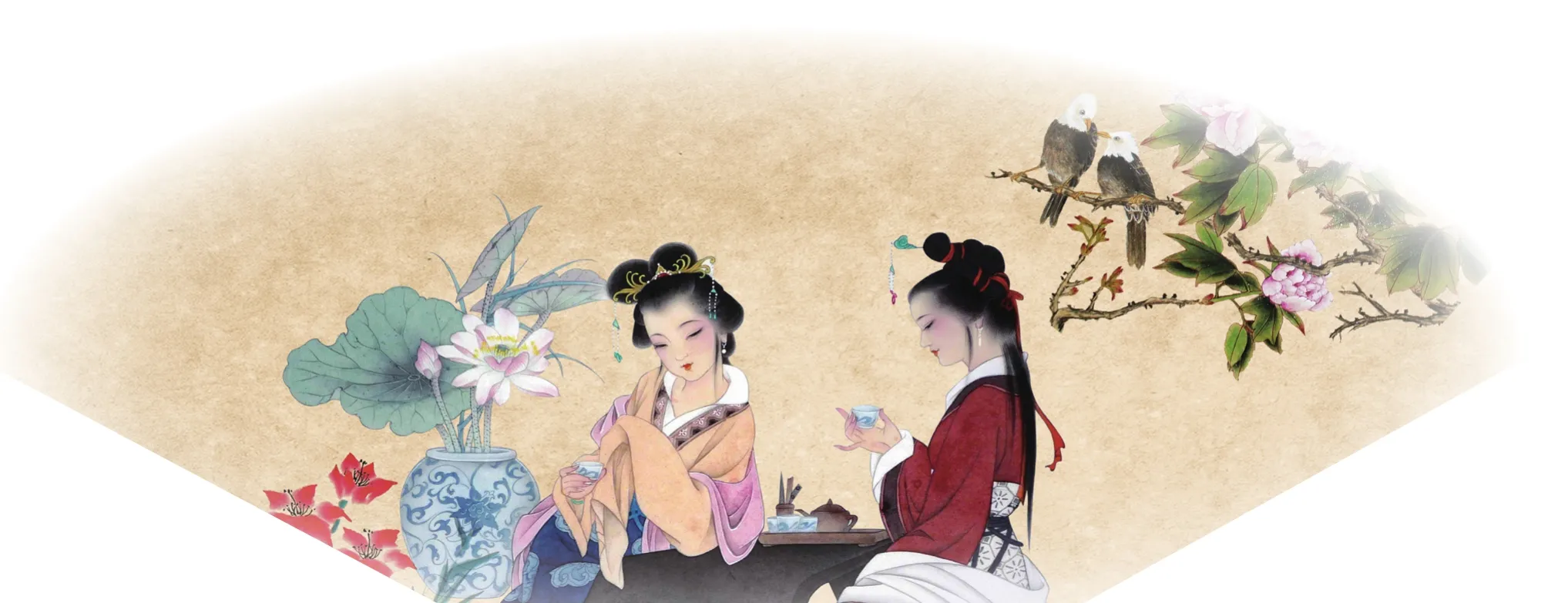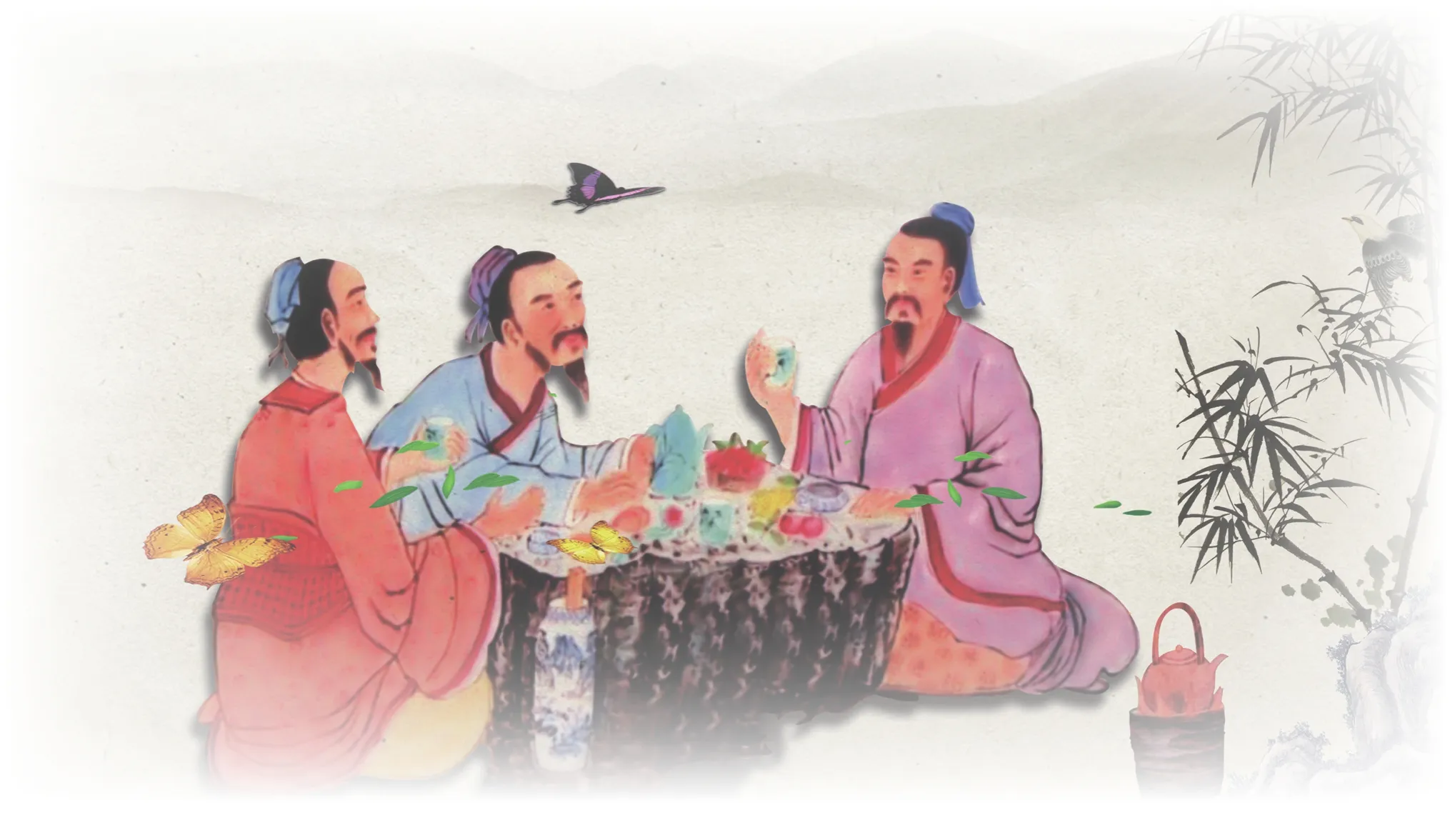草木中人 清茶一杯
文/五花肉
草木中人 清茶一杯
The Virtues of Tea
文/五花肉
1989年,著名茶学家庄晚芳先生首次提出“中国茶德”思想,用“廉、美、和、敬”四字,从道德、礼仪、社交等多个层面对“茶德”进行概括提炼,明确了茶人的精神标准和行为标准,将现代茶文化提升到了一个新境界。In 1989, the famous tea scientist Zhuang Wanfang first put forward the idea of virtues of Chinese tea, simplified it as integrity, beauty, harmony and respect from many aspects such as morality,rite, social contact, etc. This idea defines both spiritual and behavioral standards for tea masters,improving modern tea culture to another higher level.

茶亦有德
Virtues of Tea
中华传统,以德为先,饮茶也不例外。
Chinese traditions advocate morality-first, so does Tea affairs.
茶在中国具有深厚的群众基础,贯穿在人们的日常生活中,它清淡、平和的特质潜移默化地影响着饮茶人。一千多年前的唐代,茶圣陆羽在《茶经·一之源》中提到“精行俭德”,提倡茶人应具有俭朴的美德,这是最早确立的茶德标准, “茶德”概念开始萌芽。晚唐刘贞亮提出“饮茶十德”,将茶德标准的内涵从健康养生扩大到处世哲学,饮茶从生活所需慢慢演变成精神追求。
With a high popularity in China, tea is a necessity for people's daily life. Its purity and tranquility influence tea drinkers subtly. A thousand years ago in the Tang Dynasty, Lu Yu, the sage of tea, mentioned clean behavior and thrifty virtue in chapter one The Origin of Tea from The Classic of Tea, advocating tea drinkers' adherence to the basic goodness. It was the earliest standard on tea virtue, since then the concept of tea virtue began burgeoning. In late Tang Dynasty,Liu Zhenliang put forward ten virtues of tea, extending the connotation of tea virtue standard from health wellness to life philosophy. Thus, tea drinking evolved from the life necessity into the spiritual pursuit.
精神的茶
Spirit of Tea
及至当代,庄晚芳主张追求人伦和谐、其乐融融的境界,逐渐成为公认的茶德标准。可见,“德”作为茶的精神内涵和行为准则,始终贯穿在饮茶人的日常生活中,并且不断推动着茶人追求更高的精神享受。
In the contemporary era, Zhuang Wanfang's pursuit for harmonious human relationship and a state of enjoyment have gradually become recognized standards on tea virtue. It is clear that, as the spiritual connotation and standards of behavior, virtue is very important in tea drinker's daily life, encouraging them to seek spiritual enjoyment of higher level.
无论是庄晚芳的“廉、美、和、敬”,程启坤、姚国坤的“理、敬、清、融”,还是范增平的“和、俭、静、洁”等,虽然表述不尽相同,却有着共同的精神追求,即遵循茶的自然本性,主张俭朴、平和、有礼、和睦的人生观、价值观,将“物质的茶”升华为“精神的茶”。
Whether Zhuang Wanfang’s theory of integrity, beauty,harmony and respect, Cheng Qikun and Yao Guokun's concept of rationality, respect, purity and integration,or Fan Zengping's value of harmony, frugality,tranquility and cleanness, although their expressions are different, they all bear the same spiritual pursuit:following the nature of tea, advocating the values of frugality, harmony, respect and cleanness and regarding material tea as spiritual tea.
茶德之魂
Soul of Tea Virtues
茶德作为茶的精神内涵的集中体现,也是茶人的行为标准。前几期中介绍的中日茶道,是从礼法、程序等角度对茶人进行约束,而茶德则主要以“和”来规范茶人的言行。
Fully embodying tea's spiritual connotation, tea virtue also is the behavior standard for tea masters. The Chinese and Japanese teaism introduced in the past articles restrain tea masters from rites and procedures,while tea virtue regulates their words and deeds by harmony.

“和”既是中国茶道的哲学基础,也是中国茶德的灵魂。现代社会,生活节奏快,生存压力大,更需要心平气和、张弛有度。以茶待客、以礼示人,清茶一杯、洗心涤烦,往往不经意间就营造出和谐的意境。
Harmony is the philosophy foundation of Chinese teaism as well as the soul of Chinese tea virtue. It is a need for us to keep calm and balance in a society of fast-paced and stressful work. To treat people with tea and respect, sometimes a cup of tea can refresh the mind and then create a harmonious atmosphere unconsciously.
正如庄晚芳所说,中国茶德应该合乎“茶性、人性和人生正确的道德理念”。以茶养德,以和为贵,能够让人们放慢脚步、以诚相待、修身养性,培养高尚的道德情操,以更高的道德标准要求自己。
As Zhuang Wanfang said, virtues of Chinese tea should be consistent with the nature of tea, humanity,as well as right moral concepts of life. Nurturing virtues through Tea and placing harmony at the first place can slow people down, let them treat each other with integrity and cultivate moral sentiment in an effort to reach higher moral standards.
结 语
Conclusion
中华民族喝茶、爱茶、懂茶,是因为茶的特性和中华民族所推崇的廉俭淡泊、重情重礼如出一辙,继承与发扬中国茶德,对传承中华民族优良传统、传播社会正能量意义深远。
The nature of tea is exactly same with the characters of integrity, frugality and loyalty Chinese nation respect, which is a good explanation on why Chinese nation drink tea, love tea and appreciate tea. Thus,developing and upholding the virtues of Chinese tea are of great significance in inheriting traditional Chinese ethics and disseminating positive social powers.
(支持单位:上海市质量和标准化研究院)

